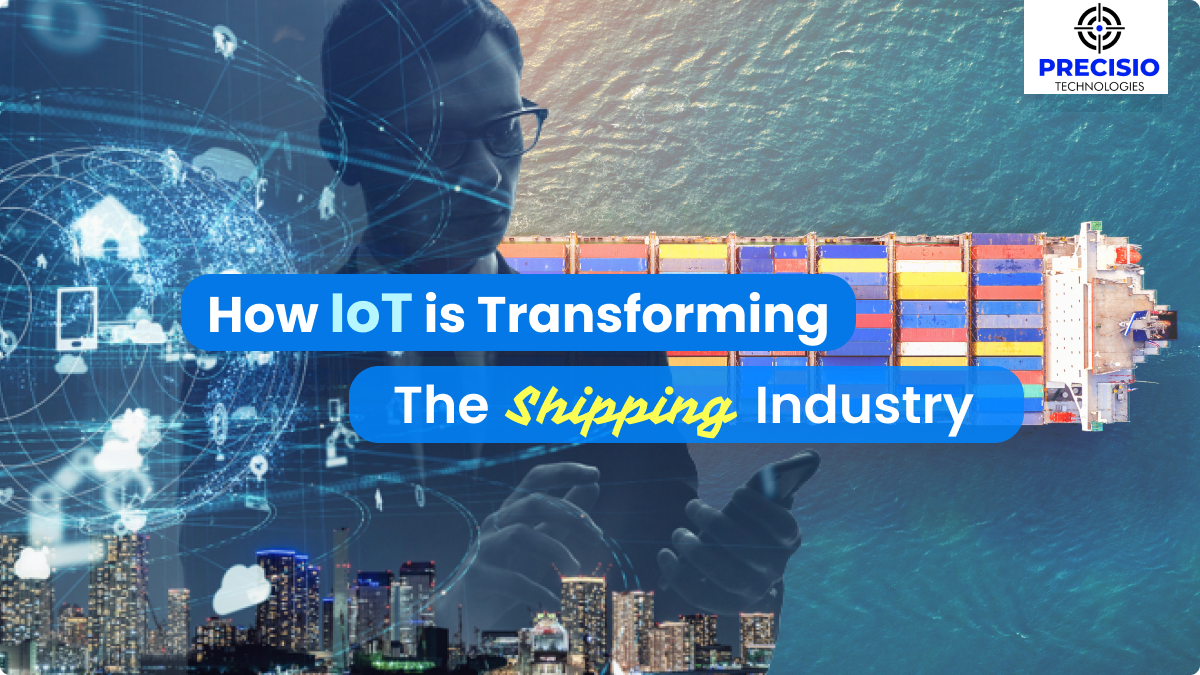
One of the most significant sectors in the world is the shipping sector. It bears the responsibility of transporting goods worth trillions of dollars annually. In recent times, there has been a significant surge in the utilization of Internet of Things (IoT) devices within the shipping sector. Why? Due to the fact that Internet of Things (IoT) devices are contributing to the enhancement of efficiency and the reduction of expenses. In the present blog entry, we shall deliberate upon the significant function that the Internet of Things (IoT) performs in the domain of shipping.
How IoT Is Used In Shipping
 The shipping industry is using IoT devices to automate processes, track shipments, and optimize routes. This helps to reduce costs and increase efficiency by cutting down on manual labor.
The shipping industry is using IoT devices to automate processes, track shipments, and optimize routes. This helps to reduce costs and increase efficiency by cutting down on manual labor.
IoT devices can also be used to monitor the temperature and humidity of containers during transit. This is important for businesses that need to ensure their products are shipped safely and arrive in good condition.
Finally, IoT devices can be used to detect tampering or security breaches. This helps to ensure that shipments are safe and secure throughout the entire shipping process. Internet of Things (IoT) devices can also serve as a means of enhancing security measures. This is essential in the shipping industry where there are many goods of high value being transported frequently.
IoT in maritime – what is it and what does it offer?
The Internet of Things (IoT) is the network of physical objects—devices, vehicles, buildings, and other items—embedded with electronics, software, sensors, and connectivity which enables these objects to collect and exchange data.
 In maritime industries, IoT is playing a significant role in improving operational efficiency by providing real-time tracking of cargo, vessels, and crew.
In maritime industries, IoT is playing a significant role in improving operational efficiency by providing real-time tracking of cargo, vessels, and crew.
An important benefit of IoT is its ability to collect data from vessels and deliver it to land-based operations for analysis in order to make informed decisions about ship movements. This helps improve safety, reduce the risk of accidents, monitor fuel consumption, and optimize loading time.
The use of IoT technology also allows for remote monitoring and control of vessels, which can reduce the costs associated with manual inspections. Additionally, real-time visibility into vessel performance and operations helps improve asset utilization by providing insight into maintenance needs and operational issues.
Overall, IoT is helping to revolutionize the maritime industry by enabling greater efficiency, cost savings, and improved safety. By leveraging the power of data-driven insights, maritime operations can become more reliable, efficient, and cost-effective.
The role of IoT in the shipping industry is only set to grow as technology advances and better solutions are developed. Numerous opportunities exist for new applications of IoT technology that can benefit the maritime industry.
These include the integration of IoT within existing ship systems, such as navigation and communications, as well as new applications for monitoring environmental conditions on board. The potential for using IoT to improve operational efficiency and increase safety is almost endless.
By leveraging the power of data-driven insights, maritime operations can become more reliable, efficient, and cost-effective. IoT is helping to revolutionize the maritime industry by providing a platform for increased safety, efficiency, and cost savings. With the help of IoT technology, ship operators can reduce costs and increase profits safely and sustainably. The possibilities are truly endless!
Why the shipping industry needs the Internet?
The Internet plays a huge role in the shipping industry, and this is only set to increase with the rise of the Internet of Things (IoT). IoT is driving improvements in efficiency, safety, and cost-saving.
Shipping companies can now use web-based tracking systems to monitor cargo location in real time from any device. This allows them to adjust routes on the fly, saving time and money.
IoT-based sensors are also being used in shipping containers to monitor temperature, humidity, and other environmental factors that can impact the quality of goods during transport. The data collected by these sensors is sent to a central hub which gives businesses greater visibility over their shipments.
Finally, IoT is also being used to improve security in the shipping industry. Secure networked tags are placed on containers and tracked throughout the supply chain, allowing for accurate tracing of goods at all times—preventing theft and fraud.
Overall, the role of IoT in shipping is hugely beneficial and has opened up a world of possibilities for businesses looking to streamline their operations. By leveraging the power of the internet, shipping companies can now ensure goods reach their destination on time and in perfect condition. This is revolutionizing the industry as we know it.
Conclusion
In a world that is constantly changing and adapting, it is important to be at the forefront of new technologies in order to maintain a successful business. It is clear that IoT plays an important role in the shipping industry. By using IoT devices, businesses can reduce costs and improve efficiency while also ensuring the safety and security of their shipments. If you are looking to streamline your shipping operations, consider investing in IoT devices and other technologies to help make it happen. IoT provides many benefits for maritime businesses including real-time data collection and analysis, predictive maintenance, better customer service, and enhanced security. If you would like to learn more about how your business can benefit from IoT, contact us today.
